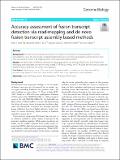Accuracy assessment of fusion transcript detection via read-mapping and de novo fusion transcript assembly-based methods
Author(s)
Regev, Aviv
DownloadPublished version (1.670Mb)
Terms of use
Metadata
Show full item recordAbstract
Background: Accurate fusion transcript detection is essential for comprehensive characterization of cancer transcriptomes. Over the last decade, multiple bioinformatic tools have been developed to predict fusions from RNA-seq, based on either read mapping or de novo fusion transcript assembly. Results: We benchmark 23 different methods including applications we develop, STAR-Fusion and TrinityFusion, leveraging both simulated and real RNA-seq. Overall, STAR-Fusion, Arriba, and STAR-SEQR are the most accurate and fastest for fusion detection on cancer transcriptomes. Conclusion: The lower accuracy of de novo assembly-based methods notwithstanding, they are useful for reconstructing fusion isoforms and tumor viruses, both of which are important in cancer research.
Date issued
2019-10-21Department
Massachusetts Institute of Technology. Department of Biology; Koch Institute for Integrative Cancer Research at MITJournal
Genome biology
Publisher
Springer Science and Business Media LLC
Citation
Haas, Brian J. et al. “Accuracy assessment of fusion transcript detection via read-mapping and de novo fusion transcript assembly-based methods.” Genome biology 20 (2019): 213 © 2019 The Author(s)
Version: Final published version
ISSN
1474-760X